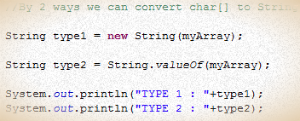
Create user defined substring functions
In many interviews we may asked to substring() a string without using substring function from String class. Below are the simple code how we can write our own substring functions similar to String class functions.
OUTPUT:
public class MyStringOp {
public static void main(String[] args) {
String str = "Java Discover";
MyStringOp obj = new MyStringOp();
System.out.println(obj.mySubstring(str, 5));
System.out.println(obj.mySubstring(str, 0,4));
}
public String mySubstring(String str, int start){
if(start > str.length())
throw new StringIndexOutOfBoundsException();
String newStr = "";
char[] ch = str.toCharArray();
for(int i=start;i<str.length();i++){
newStr = newStr + ch[i];
}
return newStr;
}
public String mySubstring(String str, int start, int end){
if((start > end) || (start > str.length()) || (end > str.length()))
throw new StringIndexOutOfBoundsException();
String newStr = "";
char[] ch = str.toCharArray();
for(int i=start;(i<str.length() && i<end);i++){
newStr = newStr + ch[i];
}
return newStr;
}
}
OUTPUT:
Discover
Java







